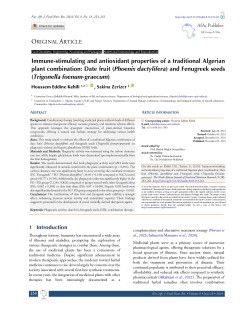Main Article Content
Immune-stimulating and antioxidant properties of a traditional Algerian plant combination: Date fruit (Phoenix dactylifera) and Fenugreek seeds (Trigonella foenum-graecum)
Abstract
Background: Combinatory therapy involving medicinal plants utilizes blends of different species to enhance therapeutic efficacy, increase potency, and minimize adverse effects. This approach leverages the synergistic interactions of plant-derived bioactive compounds, offering a natural and holistic strategy for addressing various health conditions.
Aims: This study aimed to evaluate the effects of a traditional Algerian combination of date fruit (Phoenix dactylifera) and fenugreek seeds (Trigonella foenum-graecum) on phagocytic activity and hepatic glutathione (GSH) levels.
Materials and Methods: Phagocytic activity was measured using the carbon clearance rate test, while hepatic glutathione levels were determined spectrophotometrically from the liver homogenates.
Results: The results demonstrated that both phagocytic activity and GSH levels were significantly enhanced in animals treated with the plant combination (p < 0.001). The carbon clearance rate was significantly faster in mice receiving the combined treatment (FG “Fenugreek” / PD “Phoenix dactylifera”: 14.66 ± 4.143) compared to NaCl control group (49.77 ± 16.98). Additionally, the phagocytic index was significantly higher in the FG / PD group (7.128 ± 0.823) compared to groups treated with either fenugreek alone (FG: 4.082 ± 0.306) or date fruit alone (PD: 4.87 ± 0.608). Hepatic GSH levels were also significantly elevated in the FG / PD group compared to the other groups (p = 0.040).
Conclusions: The combination of date fruit and fenugreek seeds exhibits a synergic effect, enhancing immune system activity and antioxidant capacity. These findings suggest its potential for the development of novel, naturally derived therapeutic agents.
Keywords: Phagocytic activity, date fruit, fenugreek seeds, GSH, combination therapy.







